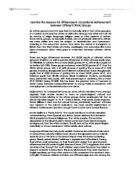Sue Sharpe’s survey found that in the 1970’s girls had low expectations and were more likely to become a housewife and mother. They only saw jobs as a means of getting money before they married. When she when she revisited girls in the 1990’s, they had higher expectation and saw jobs as careers. Her study shows the change in attitudes and expectations, which is a main reason for female overachievement. This is because women don’t want to be dependent on males, and want a career so they are not economically dependant on anyone else. This allows them to be free and have the right to choose - raising the boundaries for female success.
Females are succeeding because there are increasing job opportunities in the service sector. With increased job opportunities the women can aspire to have a career and have a well paid job. The women’s movement has raised expectations, so females want to do well in life and not just become a mother and wife. Teachers have also become aware of stereotyping, so now females can choose any subject they want to do. Even though subjects at A-levels are still gendered, for example, males tend to take physics and biology, whereas females would pick sociology and food technology. Females have more successful role models to look up to and aspire to, in the education system there are more women in senior leader teams now, rather than it being mainly consisting of men. Also changes in education have allowed females to do well in their GCSE’s and A-levels due to coursework. Females do better at coursework because they are more organised and ‘wordy’ and can meet deadlines, whereas boys aren’t as efficient in time management and are not so ‘wordy’.
Paul Willis states that the reason for male underachievement is due to the fact that they are actively trying to fail at school. They have created an ‘anti-school’ subculture where they have to live up to their macho reputation. By doing this they have sealed their opportunity for success and are blocked by the restrictions of the group to learn or do well in education. This is very typical with working class males as they are focused on immediate gratification. They do not see the use of education and would rather get a job to get money. They do not see that by getting a better education they could earn more and have better chances of getting hired.
Mitsos and Browne have suggested many reasons for the underachievement of males. One of the main reasons is that boys are over confident. Because of this, they believe that they are smarter than what they are - they feel that they can ‘wag’ it without revising - they then have a shock when they get their results! Also because of this over confidence they are more disruptive in class. They act as if they know everything and thus spend more time getting into trouble than actually learning - this not only distracts the class but prevents their learning too. Another suggestion of Mitsos and Browne is that teachers are less strict with boys than girls. They push girls to achieve their target grades, but with boys the teachers may feel more intimidated so allow them to misbehave in class. Therefore they are harder on girls when they misbehave, but not on boys because they expect it.
A reason for male underachievement is the use of negative labelling by teachers, and males acting them out - self fulfilling prophecy. If the know a teacher expected them to do badly, they will as they wont see any point in proving them wrong. Also the time boys waste by being in trouble is very valuable as they could be learning information that could improve their grades. And finally, the decline in industry has led to a decline in jobs; this has had a negative effect on boy’s motivation. This is because they may feel that there are no other jobs out for them than in the service sector - these jobs may be seen as feminine which will deter the boys from aiming their sights into service jobs.
In conclusion, girls have been over achieving due to changes in the national curriculum and having higher aspirations of careers. Boys have still been increasing in achievement, but they have not succeeded as well or as quickly as the girls, so are classed as underachieving by the media. The education system has an awareness of gender inequalities. In the 1980’s there were school initiatives such as ‘Girls into Science and Technology’, and by 1988 the National Curriculum made it compulsory for all students to do exactly the same subjects. These have helps females achieve higher, and even exceed male achievement. In the future, I feel that the gender gap will decrease as boys become more aware of jobs and qualifications that can help them in later life; so put more effort into getting good qualifications. I believe that there will still be some de-individualisation and self fulfilling prophecy, but it will be on a lesser scale.







